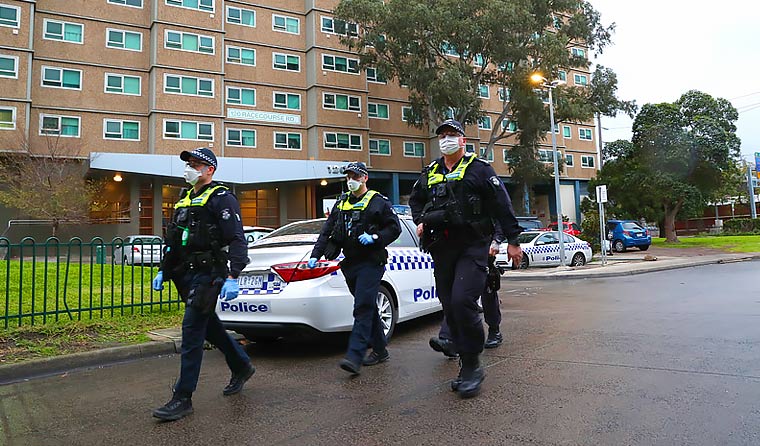News
Melbourne public housing lockdown breached human rights: Ombudsman
The snap decision to completely lockdown nine public housing towers reportedly caused ‘palpable’ distress among residents.
 Melbourne’s public housing residents had no warning before being placed in immediate lockdown.
Melbourne’s public housing residents had no warning before being placed in immediate lockdown.
In addition to the psychological damage caused by the lockdown, an inability to access food and medication contributed to the trauma experienced by those who suddenly found themselves confined entirely to their apartments, according to Victorian Ombudsmen Deborah Glass.
As a result, she found that the Victorian Government’s actions breached human rights laws and should apologise to those affected.
In her report, tabled in Victorian Parliament on Thursday, Ms Glass ruled the timing of the hard lockdown of North Melbourne and Flemington public housing towers in early July was not based on direct health advice.
Her investigation found senior health officials agreed on the morning of 4 July that the towers should be locked down to control a COVID-19 cluster but, crucially, this was not due to start until the following day in order to allow planning for food supplies and other logistics to be arranged.
However, hours later Victorian Premier Daniel Andrews announced the drastic lockdown would start immediately at a 4.00 pm press conference.
‘Like the virus it sought to contain, the immediacy of the lockdown risked the health and wellbeing of many people,’ Ms Glass told reporters.
‘Victoria’s expert on infectious diseases acting as Chief Health Officer that day told us although she signed off, the timing was not her advice and she had less than 15 minutes to review the directions and their human rights implications.’
The investigation traced the decision to a crisis cabinet meeting just over two hours earlier, although Ms Glass was denied access to documents under privilege.
‘Many residents knew nothing of the lockdown or the reason for it when large numbers of police appeared on their estate that afternoon,’ Ms Glass said. ‘We heard that initially there was chaos. Some people were without food and medicines.
‘At the tower at 33 Alfred Street, the focus of the investigation, residents waited more than a week to be allowed outside under supervision for fresh air.
‘Since March, restrictions on movement both broad and specific have been issued many times in Victoria, but never before or since without warning.’
Complicating the situation even further was the fact a ‘significant proportion’ of tower residents came from non-European backgrounds. Some had endured civil wars, dictatorships, and torture at the hands of their former government before settling in Australia
‘For them the overwhelming police presence was particularly traumatic,’ Ms Glass wrote. ‘Their distress, when they spoke to us, was palpable.’

The police presence was traumatic for many tower residents who had endured civil wars, dictatorships, and torture at the hands of their former government before settling in Australia. (Image: AAP)
About 3000 residents from nine public housing estates were prevented from leaving their homes for any reason as Victoria’s deadly second wave of coronavirus took off. But while restrictions were wound back for eight of the towers after five days, the residents of Alfred Street in North Melbourne were kept in hard lockdown for another nine days.
Ms Glass said she received nearly 150 complaints about the treatment of residents from that tower.
Although the findings are not a criticism of Victorian health officials, Ms Glass said proper consideration of human rights pre-lockdown would have put health, not security, front and centre.
‘In a just society, human rights are not a convention to be ignored during a crisis, but a framework for how we will treat and be treated as the crisis unfolds,’ she said.
The strong police presence triggered more fear than a sense of safety among many in the community and fuelled questions over the wisdom of such an approach, eventually leading to Ms Glass’ investigation.
Despite the report’s findings, however, Premier Andrews maintained that ‘all decisions during this pandemic have been based on the very best public health advice’.
‘We took the steps that the experts told us were necessary to save lives,’ he said.
Among her recommendations, Ms Glass has called on the Victorian Government to apologise for the ‘harm or distress’ the immediate lockdown caused, but noted it did not agree with her findings.
‘The Government need not apologise for taking necessary and difficult action to keep us all safe in the face of this pandemic,’ she told reporters.
‘But the rushed decision to detain 3000 people immediately did not appear to have been taken on such health advice.’
In addition, Ms Glass wants to enshrine in law the ability for someone in detention to be able to apply for a review of the decision to the Chief Health Officer and Victorian Civil and Administrative Tribunal.
They should also be briefed on the availability of relevant exemptions, any rights of complaint or review and be provided with regular and meaningful access to fresh air and outdoor exercise, wherever practicable.
Log in below to join the conversation.
COVID-19 human rights lockdown public housing
newsGP weekly poll
How often do patients ask you about weight-loss medications such as semaglutide or tirzepatide?